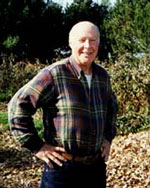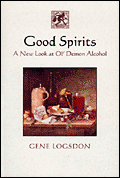O, environmental writers. The religious scribes of our day. I love them but I fear them too, because of the way self-righteousness can rear up like some suddenly animated pond scum in a Stephen King movie and cover the picnic, the teenagers, everything that was ever fun and alive and moving around. Wait, it’s not that bad. It’s just that I find my environmental angst a lot easier to take when it’s served up with a dose of humor.

There’s no cloning this Gene.
Photo: Lisa Jones.
So when I had an opportunity recently, during a cross-country drive, to stop in rural Ohio to meet Gene Logsdon, I did. Gene Logsdon writes like a dream (a reader of one of his 18 books calls him “a hard-working thinking person’s genius and a national treasure”). And he covers all the right things — family farming, the corporatization of agriculture, and how to brew really good beer. He’s funny and humble, and when the unjustness of the world makes him angry — which is often — he gets mad in just the right way. His anger is direct and sharp and on target.
Take this memo he wrote a decade ago to Fred Miller, the head of Ohio State University’s Agronomy Department, during a heated debate over whether colleges of agriculture had abandoned family farmers for industrial farming:
Recently one of your hotshot economists came up to Wyandot County and told us we were “just going to have to live with $2.20 [per bushel of] corn.” Do you realize how angry you made us? As one farmer growled out of earshot: “And you, professor, are just going to have to live on a $15,000 salary.” … If the university did not keep alive an obsolete system with tax money and other forms of welfare accompanied by the oligarchical power you wield in the statehouse, many of your professors would have to “go to town” to get a job, just like you bastards tell farmers to do. …
You say farmers won’t accept the kind of advice we “radicals” are giving them. Of course they aren’t going to accept it all at once now that they are virtually helpless to a system you promulgated, but even then, how do you know what they will accept? There are quite a few farmers who accept it because they never stopped farming that way. But what have you done, really, to bring about reform in farming? … I have never heard the ag departments of the land grant colleges rise in concert to protest any social injustice at all in agriculture … It is not the university’s job to find ways for the greediest sons of bitches in the farming community to make yet more money, but to act as a thoughtful and, yes, philosophical voice of reason and morality in the conduct of farm affairs. …
I have a lot more to say, but I’ve insulted you too much already. I mean nothing personally. You have to stand in the place of your obsolete university and its hypocrisy. You may even be a nice guy. So am I, normally. But dammit, Fred, turning farming into an oligarchy of rich landlords is not good and not right, and you must take part of the blame. So must I, for that matter. I worked for Farm Journal for nine years and helped with the Great Brainwash.
Home Free

Gene grew up in what sounds like excruciatingly joyous circumstances as one of nine siblings on a farm. He spent his adulthood training as a priest, writing for Farm Journal in Philadelphia, and writing a book on Maine painter Andrew Wyeth. When he finally came back home to Upper Sandusky, Ohio, in 1974, at the age of 43, he whooped with the elemental joy of being back on the farm. This is all enumerated in his book You Can Go Home Again.
I stopped at his 40 acres of wood lot, sheep pasture, and vegetable garden, ate a bowl of superior chicken soup, and chatted with Gene and his wife, Carol. He was just as interested in having a good laugh as anything else, which made me want to unload my car and move in for a few days. Conversation touched on the future of farming. (Gene predicts biotechnology will pave the way for small niche farms, which will produce “pharmaceutical foods.” For example, a gene could be injected into goats which would induce them to produce milk that’s good for people who’ve had bypass surgery.)

We also talked about his new book, Good Spirits: A New Look at Ol’ Demon Alcohol. This is not a book on anything as lofty as ethanol conversion; it is a book about bootlegging, which his Kentucky-bred wife’s forbears practiced with enthusiasm. He predicted that this will alienate some of his socially conservative readers, sighed, looked out the window, and laughed.
But mostly we talked about being at home. Andrew Wyeth insisted on becoming intimate with a place. “Wyeth said you have to stay home. He wouldn’t travel. He wouldn’t go to Europe. He wouldn’t give speeches. He really knew the family who’s farm he painted. Everything he said is what I already thought. He and Wendell Berry convinced me that I wanted to come back here.”
Gene talks about really knowing the land: “Every November or December, when the sun is setting, the oak tree bark is orange. And I don’t mean play orange. I mean orange. I don’t think you’d ever expect that. There’s hundreds of things like that that you’d never think to describe.
“More to the point is the people. I know people who for 20 years, you’d never get a word out of them. And then they say something. Maybe a very happy thing; maybe a very tragic thing. There’s a really cracking good story in every house. You have to live somewhere a long time, you’ve got to be careful about dragging it out of them.”
Overall, what he’s trying to do is this: “I like to think I’m writing about independence and self-reliance,” he says. “I don’t care if you’re a farmer or not. I’m hoping in my books I’m making people question what’s economics. Because what we call economics right now is very destructive of ecology.”


